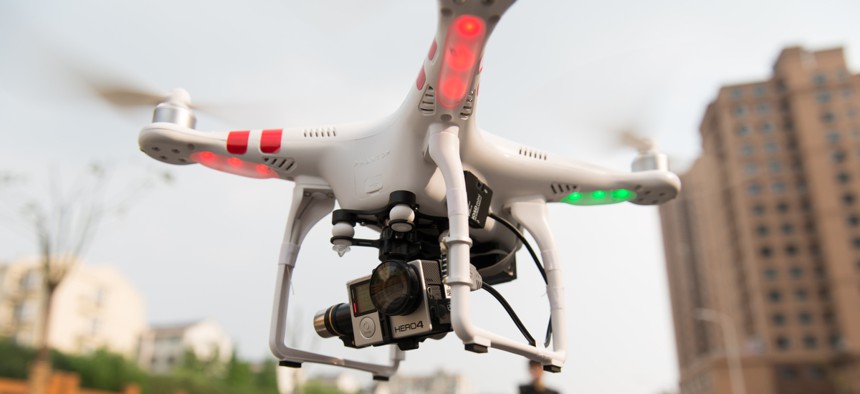Chinese Drone Manufacturers Pose Huawei-Like Threats, Expert Says

Lu Yao/Shutterstock
Officials allege the Chinese government is using native drone companies to collect “an unprecedented level” of intelligence on the U.S.
The government needs to spur a “Manhattan Project-style investment” in America’s unmanned aircraft industry to combat the economic and national security threats posed by Chinese drone manufacturers, a cybersecurity expert told lawmakers.
“These foreign drones are exploiting us and putting ... our American businesses and government organizations at risk,” National Defense University Professor Harry Wingo said Tuesday. “These threats should not and cannot be ignored.”
Roughly 80 percent of the drones in the U.S. are made by Chinese companies, and the Chinese government is using that foothold to collect “an unprecedented level” of intelligence on America’s physical and economic infrastructure, Wingo told the Senate Commerce Security subcommittee. That intimate understanding of America’s inner workings could potentially give the Chinese an economic and military edge, he said, and creates “significant cybersecurity risks” for U.S. businesses and government agencies.
Those threats will only be exacerbated as the Chinese government ramps up its artificial intelligence capabilities, which would help officials rapidly analyze the information they collect, he added.
In an exchange with Ranking Member Ed Markey, D-Mass., Wingo said the threats from Chinese drones resemble those posed by Huawei, the Chinese telecom titan the White House is trying to effectively blacklist from U.S. markets.
During the hearing, Sen. Rick Scott, R-Fla., proposed the government follow a similar playbook with Chinese drone manufacturers like DJI. Though Wingo agreed an outright ban on Chinese drones is appropriate in cases tied to public safety and critical infrastructure, he said empowering U.S. manufacturers to “compete vigorously” with their Chinese counterparts would be a more effective solution.
“The main thing we have to do is look at drones as infrastructure, and consider, really, a Manhattan Project-style investment” in the domestic industry, Wingo said. He referenced a presidential memo signed last week that declared the country’s small unmanned aircraft industry “essential to the national defense.”
Beyond money, he added, promoting the use of open source software for drones could give U.S. manufacturers a leg up over their Chinese competitors, which rely on proprietary systems.
During the hearing, lawmakers also called for the Federal Aviation Administration to move forward on measures that would enable law enforcement agencies to better identify and intercept rogue drones.
DJI Technology told Nextgov the claims made at the hearing are false. "As a privately-held global technology company, DJI gives customers full and complete control over how their data is collected, stored, and transmitted. DJI drones do not share any data with DJI, over the internet, or in any other manner unless the operator deliberately chooses to do so," Adam Lisberg, DJI Technology's corporate communications director said. "The security of our technology has been independently verified by the U.S. government, and our products meet all of the U.S. Department of Homeland Security’s data management recommendations. DJI is proud to play a central role in driving the U.S. drone economy, which is expected to surpass $82 billion and create more than 100,000 jobs by 2025, and we welcome a competitive and open market that promotes innovation, safety, reliability, and security."
Editor's note: This article was updated with a statement from DJI Technology.






